人教版九年级全册Unit 7 Teenagers should be allowed to choose their own clothes Section B 2a-2e课件(共44张PPT)
文档属性
| 名称 | 人教版九年级全册Unit 7 Teenagers should be allowed to choose their own clothes Section B 2a-2e课件(共44张PPT) |
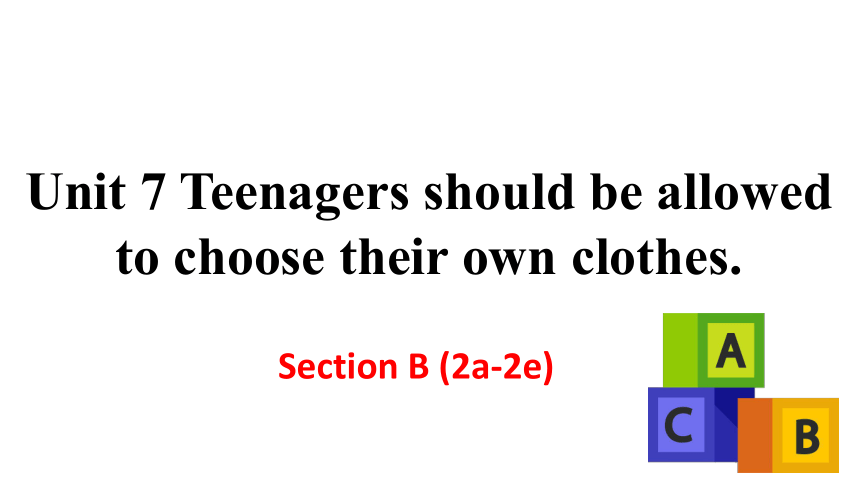
|
|
| 格式 | pptx | ||
| 文件大小 | 3.3MB | ||
| 资源类型 | 教案 | ||
| 版本资源 | 人教新目标(Go for it)版 | ||
| 科目 | 英语 | ||
| 更新时间 | 2024-07-05 00:00:00 | ||
图片预览

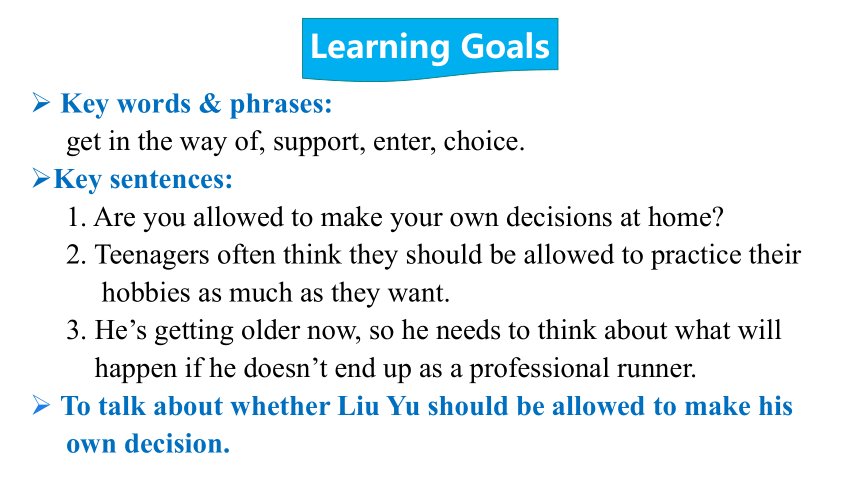

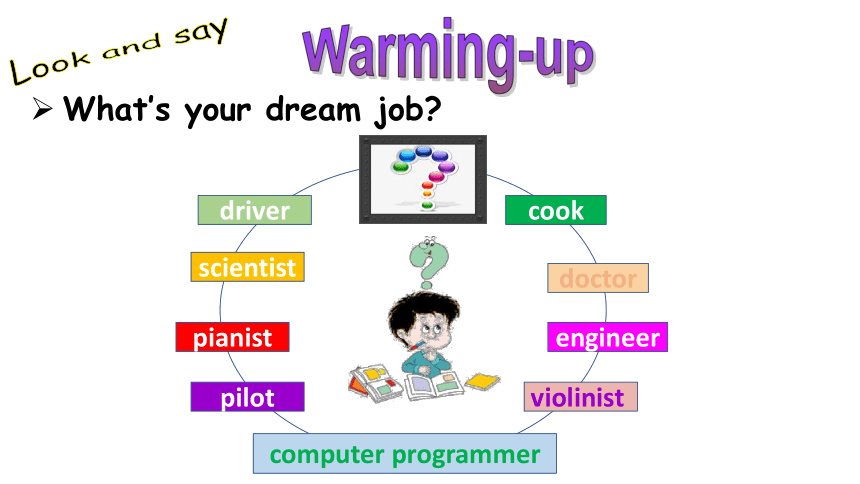

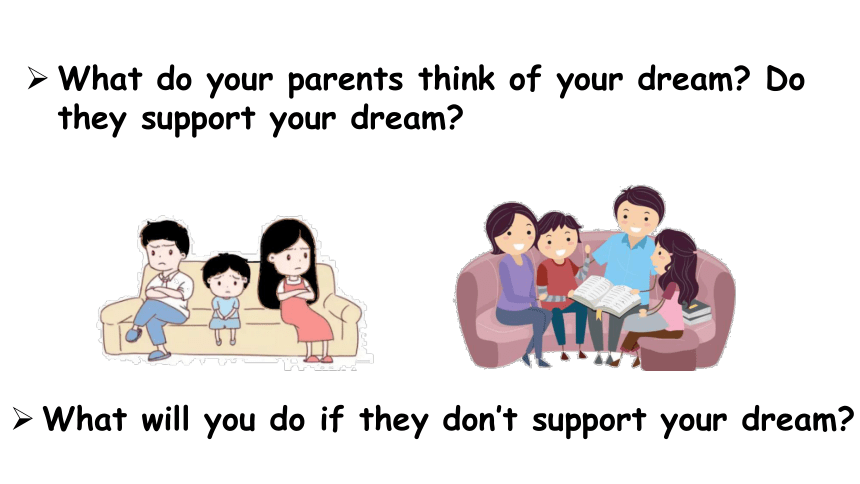

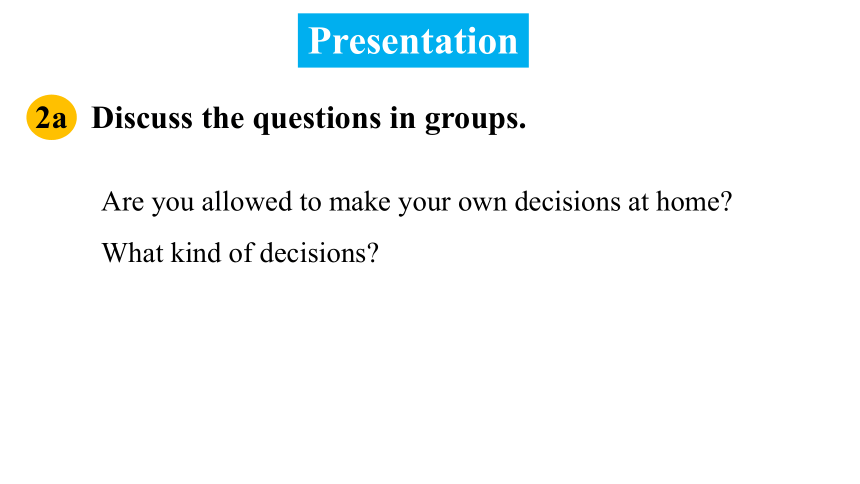
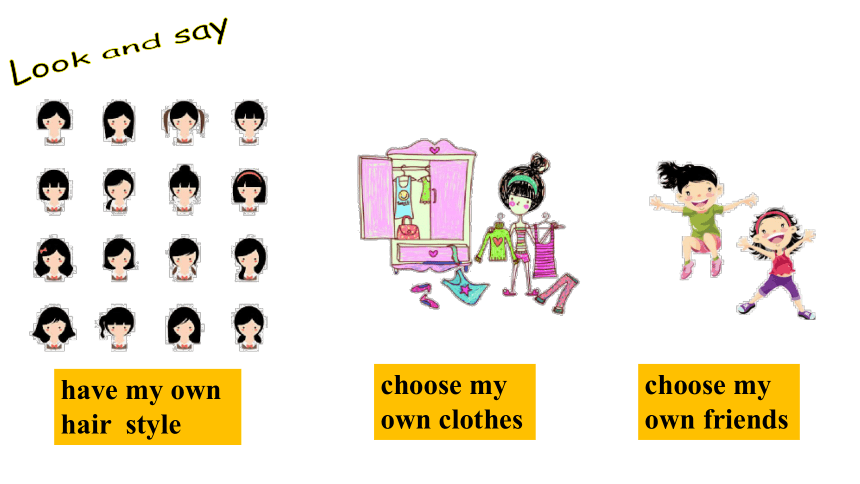
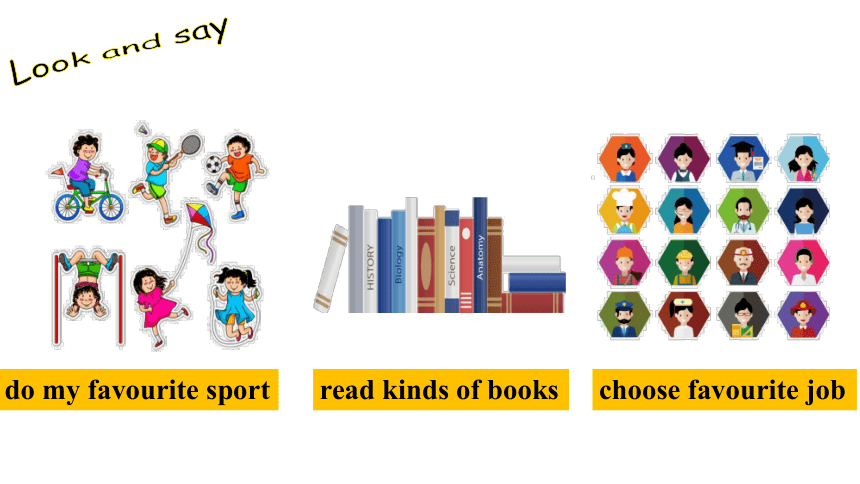
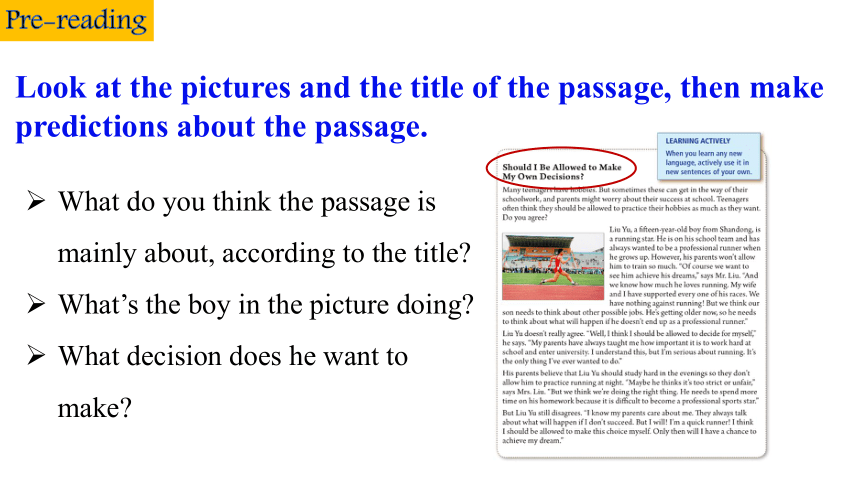
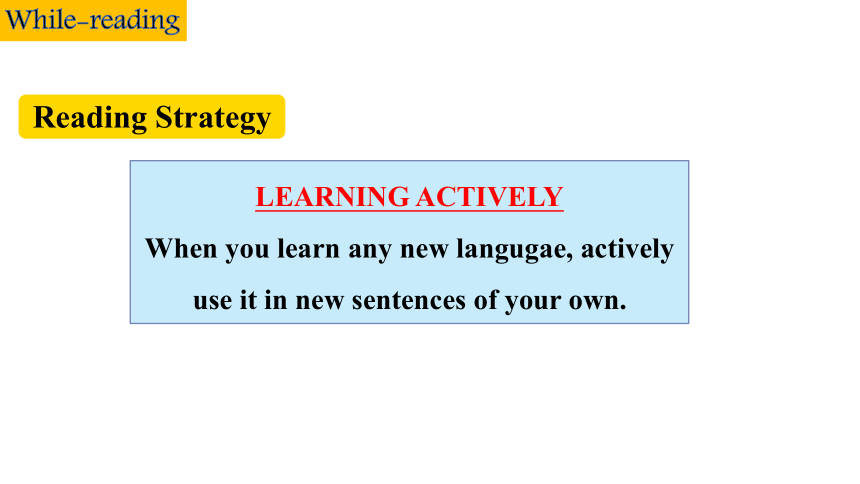
文档简介
(共44张PPT)
Section B (2a-2e)
Unit 7 Teenagers should be allowed to choose their own clothes.
Learning Goals
Key words & phrases:
get in the way of, support, enter, choice.
Key sentences:
1. Are you allowed to make your own decisions at home
2. Teenagers often think they should be allowed to practice their
hobbies as much as they want.
3. He’s getting older now, so he needs to think about what will
happen if he doesn’t end up as a professional runner.
To talk about whether Liu Yu should be allowed to make his
own decision.
Words & Expressions
Let's read
get in the way of
support
enter
choice
挡……的路;妨碍
v. & n. 支持
v. 进来;进去
n. 选择;挑选
Warming-up
What’s your dream job
Look and say
computer programmer
cook
doctor
engineer
violinist
driver
pilot
pianist
scientist
How do you like your dream Is it easy or difficult to come true Is it idealistic or realistic Will you stick to your dream What will you do to achieve your dream
Let's discuss !
What do your parents think of your dream Do they support your dream
What will you do if they don’t support your dream
Are you allowed to make your own decisions at home What kinds of decisions
What is the one decision you want to make most now
Do you think you might be allowed to make this decision why
Lead in
Presentation
2a
Discuss the questions in groups.
Are you allowed to make your own decisions at home
What kind of decisions
have my own hair style
choose my own clothes
choose my own friends
Look and say
Look and say
do my favourite sport
read kinds of books
choose favourite job
Pre-reading
Look at the pictures and the title of the passage, then make predictions about the passage.
What do you think the passage is mainly about, according to the title
What’s the boy in the picture doing
What decision does he want to make
While-reading
Reading Strategy
LEARNING ACTIVELY
When you learn any new langugae, actively use it in new sentences of your own.
2b
First, look at the title of the passage. Answer “yes” or “no”. Find out how many in your group agree with you. Then read the passage. Answer “yes” or “no” again. Does your answer change Why
Should I Be Allowed to Make My Own Decisions
Should I Be Allowed to Make My Own Decisions
Many teenagers have hobbies. But sometimes these can get in the way of their schoolwork, and parents might worry about their success at school. Teenagers often think they should be allowed to pactice their hobbies as much as they want. Do you agree
Liu Yu, a fifteen-year-old boy from shandong,is a running star. He is on his school team and is always wanted to be a professional runner when he grows up. However, his parents won't allow him to train so much. “Of course we want to see him achieve his dreams,” says Mr. Liu. “And we know how much he loves running. My wife and I have supported every one of his races.We have nothing against running. But we think our son needs to think about other possible jobs. He's getting older now, so he needs to think about what will happen if he doesn't end up as a professional runner.”
Liu Yu doesn't really agree. “Well, I think I should be allowed to decdide for myself,” he says. “My parents have alway taught me how important it is to work hard at school and enter university. I understand this, but I'm serious about running. It's the only thing I've ever wanted to do.”
His parents believe that Liu Yu should study hard in the evenings so they don't allow him to practice running at night. “Maybe he thinks it's too strict or unfair,” says Mrs. Liu. “But we think we're doing the right thing. He needs to spend more time on his homework because it is difficult to become a professional sports star.”
But Liu Yu still disagrees. “I know my parents care about me. They always talk about what will happen if I don't succeed. But I will! I'm a quick runner! I think I should be allowed to make this choice myself. Only then will I have a chance to achieve my dream.”
Let’s skim.
While-reading
Read the passage quickly and get the main idea.
A. Teenagers’ points(观点) about hobbies and schoolwork.
B. Liu Yu’s Parents don't want him to be a professional runner.
C. Liu Yu’s and his parents’ different points about his hobby and schoolwork.
While-reading
Let’s scan.
Name
Age
From
Hobby
Dream job
Problem
Read Para.2 carefully and fill in the blanks.
Liu Yu
a fifteen-year-old boy
Shandong
running
be a professional runner
His parents won’t allow him to train so much.
Let’s scan.
While-reading
Different opinions about Liu Yu’s hobby—running
Parents: They won’t allow him to _____ so much. They have ________ against running, but they think they’re doing the ______ thing, and Liu Yu needs spend more time on his ________________________.
Liu Yu: He should be allowed to _______ for himself. He’s _______ about running. He thinks he’ll succeed. He should be allowed to make this choice ________. Only then will he have a _______ to achieve his dream.
train
nothing
right
homework/schoolwork
decide
serious
himself
chance
Read the passage again and answer the questions.
2c
1. What is Liu Yu’s hobby
His hobby is running.
2. What does Liu Yu want to be when he grows up
He wants to be a professional runner.
3. Why do Liu Yu’s parents not allow Liu Yu to practice his hobby
at night
Because Liu Yu’s parents believe that he should study hard in the evenings.
4. Do you think Liu Yu should be allowed to practice his hobby as
much as he wants Why or why not
Suggested answers:
Yes, he has the potential to be a running star./ No, his parents know best. His dream may not be realistic and he may regret it in the future if he does not study hard now.
2d
Look in the passage for the words in bold. Then use them to complete sentences of your own.
1. My parents worry about _____________________________.
2. My parents have always taught me how important it is to ___________________________________________________.
3. I am serious about _________________________________.
4. I think it is unfair ____________________________________.
my school results
be honest in all situations
my part-time jobs
that I’m not allowed to hang out with friends
5. I have always wanted to be ________________________.
6. My parents have nothing against ______________________.
7. I need to think about what will happen if
________________________________________________.
8. I need to spend more time on _______________________.
a pilot
makeup
I don’t get a place in the university of my choice
practicing the piano
2e
Discuss the questions with a partner. Use the information in the passage to support your opinion.
What is your dream job
Do your parents support your dream
Post-reading
The Argument:
Should Liu Yu be allowed to
make his own decisions
Yes.
No.
Big debate
Sometimes hobbies can get in the way of schoolwork, Liu Yu and his parents have different points …
Pro Side
Con Side
Language Points
get in the way of为固定短语,后接名词、代词或动词-ing。可用be in one’s way或be in the way of...替换。
Playing computer games can get in the way of your study.
Don’t stand at the door. You’re in my way.
1. But sometimes these can get in the way of their schoolwork,…
(教材P54 )
get in the way of 挡...... 的路;妨碍
(1)此处support 作及物动词,意为“支持”。
support sb. /sth. (in... )意为“ (在......方面)支持某人/某事”。
Whatever you do, I will support you forever.
(2)support还可作不可数名词,意为“支持”。
We’re very thankful for your support.
2. My wife and I have supported every one of his races.
(教材P54)
support /s p :(r)t/ v. & n. 支持
support作动词,还可意为“养活,赡养;资助,赞助”。
Several major companies are supporting the project.
He has a large family to support.
I have nothing against homework, but I don’t want to do so much homework.
against 作介词,在此处意为“反对”,其反义词是for。 be against (doing) sth.反对(做)某事。
We are against cutting down too many trees.
3. We have nothing against running! (教材P54)
have nothing against ( doing) sth. 不反对
拓展:against 的其他常见含义:
(1)反对;碰;撞,常与beat, fight, struggle, argue 等词搭配。
She fell down and hit her head against the ground.
她摔倒了头撞在了地上。
(2)与……比赛(打仗等)。play against 与……比赛/ 对抗
The soldiers fought against the enemy bravely.
战士们勇敢地同敌人斗争。
(3)紧靠;倚
He was leaning against the door. 他正倚在门上。
enter作动词,在此处意为“考上(大学或学校)”。此外,enter 还意为“进来;进去”,相当于go/ come into, 所以不再与介词into 连用。
I believe I will enter a good high school this year if I try hard.
4. My parents have always taught me how important it is to work hard
at school and enter university.(教材P54)
enter / ent (r)/ v. 进来;进去
(1)enter作动词还有“报名参加”的意思。
Linda will enter a writing competition.
(2)enter的名词形式为entrance,意为“入口”。
Let’s meet at the entrance of the cinema.
be serious about为固定短语,后接名词、代词或动词-ing 形式。其同义短语为take … seriously。
You must be serious about your P. E. training.
= You must take your P. E. training seriously.
5. I understand this, but I’m serious about running.
(教材P54)
be serious about 对.....认真
choice 作名词,其动词形式为choose。make a choice做出选择;have no choice but to do sth. 除了做某事外别无选择。
It is important for us to make a wise choice of using smartphones.
I have run out of my money. I have no choice but to walk home!
6. I think I should be allowed to make this choice myself.
(教材P54)
choice /t s/ n. 选择;挑选
only 引导的倒装句
当only位于句首,后接副词、介词短语或状语从句时,句子要用部分倒装结构。即:Only + 副词/介词短语/ 状语从句 +助动词/ be 动词/ 情态动词+ 主语 + 其他.
e.g. Only when you leave school will you realize the importance of study.
只有当你毕业了,你才会意识到学习的重要性。
7. Only then will I have a chance to achieve my dream.(教材P54)
Exercises
一、根据汉语提示或用括号内所给词的适当形式填空
1.We have nothing against _________(play) computer games,
but don’t play them too much.
Maybe it’s a good _________ (选择)to live in the countryside nowadays.
When I _______ (进入) Katy’s room, she was not in her bed.
choice
playing
enter
4. Which football team do you _________ (支持)?
5. David’s dream is to be a ___________ (职业的)runner.
6. Spending too much time on computer games may _______________ (妨碍)your study. So you’d better give it up.
support
professional
get in the way of
二、单项选择
— Jerry looks so tired. He works too hard.
— He has to ______ a family of four on his own.
A. offer B. support C. provide D. remain
2. — It’s a clever ________ to wear the pink tie. It matches your
shirt well.
— Thank you very much.
A. offer B. change
C. chance D. choice
D
B
3. Our class are much sure to win the basketball game ________
Class Three.
A. of B. in C. against D. from
— Do you mean you will join the club
— Yes, I am ______ it.
A. nervous about B. tired of C. serious about D. worried about
C
C
Homework
Read and recite the passage in 2b.
Do the exercises in students’ book.
Thank you!
Section B (2a-2e)
Unit 7 Teenagers should be allowed to choose their own clothes.
Learning Goals
Key words & phrases:
get in the way of, support, enter, choice.
Key sentences:
1. Are you allowed to make your own decisions at home
2. Teenagers often think they should be allowed to practice their
hobbies as much as they want.
3. He’s getting older now, so he needs to think about what will
happen if he doesn’t end up as a professional runner.
To talk about whether Liu Yu should be allowed to make his
own decision.
Words & Expressions
Let's read
get in the way of
support
enter
choice
挡……的路;妨碍
v. & n. 支持
v. 进来;进去
n. 选择;挑选
Warming-up
What’s your dream job
Look and say
computer programmer
cook
doctor
engineer
violinist
driver
pilot
pianist
scientist
How do you like your dream Is it easy or difficult to come true Is it idealistic or realistic Will you stick to your dream What will you do to achieve your dream
Let's discuss !
What do your parents think of your dream Do they support your dream
What will you do if they don’t support your dream
Are you allowed to make your own decisions at home What kinds of decisions
What is the one decision you want to make most now
Do you think you might be allowed to make this decision why
Lead in
Presentation
2a
Discuss the questions in groups.
Are you allowed to make your own decisions at home
What kind of decisions
have my own hair style
choose my own clothes
choose my own friends
Look and say
Look and say
do my favourite sport
read kinds of books
choose favourite job
Pre-reading
Look at the pictures and the title of the passage, then make predictions about the passage.
What do you think the passage is mainly about, according to the title
What’s the boy in the picture doing
What decision does he want to make
While-reading
Reading Strategy
LEARNING ACTIVELY
When you learn any new langugae, actively use it in new sentences of your own.
2b
First, look at the title of the passage. Answer “yes” or “no”. Find out how many in your group agree with you. Then read the passage. Answer “yes” or “no” again. Does your answer change Why
Should I Be Allowed to Make My Own Decisions
Should I Be Allowed to Make My Own Decisions
Many teenagers have hobbies. But sometimes these can get in the way of their schoolwork, and parents might worry about their success at school. Teenagers often think they should be allowed to pactice their hobbies as much as they want. Do you agree
Liu Yu, a fifteen-year-old boy from shandong,is a running star. He is on his school team and is always wanted to be a professional runner when he grows up. However, his parents won't allow him to train so much. “Of course we want to see him achieve his dreams,” says Mr. Liu. “And we know how much he loves running. My wife and I have supported every one of his races.We have nothing against running. But we think our son needs to think about other possible jobs. He's getting older now, so he needs to think about what will happen if he doesn't end up as a professional runner.”
Liu Yu doesn't really agree. “Well, I think I should be allowed to decdide for myself,” he says. “My parents have alway taught me how important it is to work hard at school and enter university. I understand this, but I'm serious about running. It's the only thing I've ever wanted to do.”
His parents believe that Liu Yu should study hard in the evenings so they don't allow him to practice running at night. “Maybe he thinks it's too strict or unfair,” says Mrs. Liu. “But we think we're doing the right thing. He needs to spend more time on his homework because it is difficult to become a professional sports star.”
But Liu Yu still disagrees. “I know my parents care about me. They always talk about what will happen if I don't succeed. But I will! I'm a quick runner! I think I should be allowed to make this choice myself. Only then will I have a chance to achieve my dream.”
Let’s skim.
While-reading
Read the passage quickly and get the main idea.
A. Teenagers’ points(观点) about hobbies and schoolwork.
B. Liu Yu’s Parents don't want him to be a professional runner.
C. Liu Yu’s and his parents’ different points about his hobby and schoolwork.
While-reading
Let’s scan.
Name
Age
From
Hobby
Dream job
Problem
Read Para.2 carefully and fill in the blanks.
Liu Yu
a fifteen-year-old boy
Shandong
running
be a professional runner
His parents won’t allow him to train so much.
Let’s scan.
While-reading
Different opinions about Liu Yu’s hobby—running
Parents: They won’t allow him to _____ so much. They have ________ against running, but they think they’re doing the ______ thing, and Liu Yu needs spend more time on his ________________________.
Liu Yu: He should be allowed to _______ for himself. He’s _______ about running. He thinks he’ll succeed. He should be allowed to make this choice ________. Only then will he have a _______ to achieve his dream.
train
nothing
right
homework/schoolwork
decide
serious
himself
chance
Read the passage again and answer the questions.
2c
1. What is Liu Yu’s hobby
His hobby is running.
2. What does Liu Yu want to be when he grows up
He wants to be a professional runner.
3. Why do Liu Yu’s parents not allow Liu Yu to practice his hobby
at night
Because Liu Yu’s parents believe that he should study hard in the evenings.
4. Do you think Liu Yu should be allowed to practice his hobby as
much as he wants Why or why not
Suggested answers:
Yes, he has the potential to be a running star./ No, his parents know best. His dream may not be realistic and he may regret it in the future if he does not study hard now.
2d
Look in the passage for the words in bold. Then use them to complete sentences of your own.
1. My parents worry about _____________________________.
2. My parents have always taught me how important it is to ___________________________________________________.
3. I am serious about _________________________________.
4. I think it is unfair ____________________________________.
my school results
be honest in all situations
my part-time jobs
that I’m not allowed to hang out with friends
5. I have always wanted to be ________________________.
6. My parents have nothing against ______________________.
7. I need to think about what will happen if
________________________________________________.
8. I need to spend more time on _______________________.
a pilot
makeup
I don’t get a place in the university of my choice
practicing the piano
2e
Discuss the questions with a partner. Use the information in the passage to support your opinion.
What is your dream job
Do your parents support your dream
Post-reading
The Argument:
Should Liu Yu be allowed to
make his own decisions
Yes.
No.
Big debate
Sometimes hobbies can get in the way of schoolwork, Liu Yu and his parents have different points …
Pro Side
Con Side
Language Points
get in the way of为固定短语,后接名词、代词或动词-ing。可用be in one’s way或be in the way of...替换。
Playing computer games can get in the way of your study.
Don’t stand at the door. You’re in my way.
1. But sometimes these can get in the way of their schoolwork,…
(教材P54 )
get in the way of 挡...... 的路;妨碍
(1)此处support 作及物动词,意为“支持”。
support sb. /sth. (in... )意为“ (在......方面)支持某人/某事”。
Whatever you do, I will support you forever.
(2)support还可作不可数名词,意为“支持”。
We’re very thankful for your support.
2. My wife and I have supported every one of his races.
(教材P54)
support /s p :(r)t/ v. & n. 支持
support作动词,还可意为“养活,赡养;资助,赞助”。
Several major companies are supporting the project.
He has a large family to support.
I have nothing against homework, but I don’t want to do so much homework.
against 作介词,在此处意为“反对”,其反义词是for。 be against (doing) sth.反对(做)某事。
We are against cutting down too many trees.
3. We have nothing against running! (教材P54)
have nothing against ( doing) sth. 不反对
拓展:against 的其他常见含义:
(1)反对;碰;撞,常与beat, fight, struggle, argue 等词搭配。
She fell down and hit her head against the ground.
她摔倒了头撞在了地上。
(2)与……比赛(打仗等)。play against 与……比赛/ 对抗
The soldiers fought against the enemy bravely.
战士们勇敢地同敌人斗争。
(3)紧靠;倚
He was leaning against the door. 他正倚在门上。
enter作动词,在此处意为“考上(大学或学校)”。此外,enter 还意为“进来;进去”,相当于go/ come into, 所以不再与介词into 连用。
I believe I will enter a good high school this year if I try hard.
4. My parents have always taught me how important it is to work hard
at school and enter university.(教材P54)
enter / ent (r)/ v. 进来;进去
(1)enter作动词还有“报名参加”的意思。
Linda will enter a writing competition.
(2)enter的名词形式为entrance,意为“入口”。
Let’s meet at the entrance of the cinema.
be serious about为固定短语,后接名词、代词或动词-ing 形式。其同义短语为take … seriously。
You must be serious about your P. E. training.
= You must take your P. E. training seriously.
5. I understand this, but I’m serious about running.
(教材P54)
be serious about 对.....认真
choice 作名词,其动词形式为choose。make a choice做出选择;have no choice but to do sth. 除了做某事外别无选择。
It is important for us to make a wise choice of using smartphones.
I have run out of my money. I have no choice but to walk home!
6. I think I should be allowed to make this choice myself.
(教材P54)
choice /t s/ n. 选择;挑选
only 引导的倒装句
当only位于句首,后接副词、介词短语或状语从句时,句子要用部分倒装结构。即:Only + 副词/介词短语/ 状语从句 +助动词/ be 动词/ 情态动词+ 主语 + 其他.
e.g. Only when you leave school will you realize the importance of study.
只有当你毕业了,你才会意识到学习的重要性。
7. Only then will I have a chance to achieve my dream.(教材P54)
Exercises
一、根据汉语提示或用括号内所给词的适当形式填空
1.We have nothing against _________(play) computer games,
but don’t play them too much.
Maybe it’s a good _________ (选择)to live in the countryside nowadays.
When I _______ (进入) Katy’s room, she was not in her bed.
choice
playing
enter
4. Which football team do you _________ (支持)?
5. David’s dream is to be a ___________ (职业的)runner.
6. Spending too much time on computer games may _______________ (妨碍)your study. So you’d better give it up.
support
professional
get in the way of
二、单项选择
— Jerry looks so tired. He works too hard.
— He has to ______ a family of four on his own.
A. offer B. support C. provide D. remain
2. — It’s a clever ________ to wear the pink tie. It matches your
shirt well.
— Thank you very much.
A. offer B. change
C. chance D. choice
D
B
3. Our class are much sure to win the basketball game ________
Class Three.
A. of B. in C. against D. from
— Do you mean you will join the club
— Yes, I am ______ it.
A. nervous about B. tired of C. serious about D. worried about
C
C
Homework
Read and recite the passage in 2b.
Do the exercises in students’ book.
Thank you!
同课章节目录
- Unit 1 How can we become good learners.
- Section A
- Section B
- Unit 2 I think that mooncakes are delicious!
- Section A
- Section B
- Unit 3 Could you please tell me where the restroom
- Section A
- Section B
- Unit 4 I used to be afraid of the dark.
- Section A
- Section B
- Unit 5 What are the shirts made of?
- Section A
- Section B
- Review of Units 1-5
- Unit 6 When was it invented?
- Section A
- Section B
- Unit 7 Teenagers should be allowed to choose their
- Section A
- Section B
- Unit 8 It must belong to Carla.
- Section A
- Section B
- Unit 9 I like music that I can dance to.
- Section A
- Section B
- Unit 10 You're supposed to shake hands.
- Section A
- Section B
- Review of Units 6-10
- Unit 11 Sad movies make me cry.
- Section A
- Section B
- Unit 12 Life is full of the unexpected
- Section A
- Section B
- Unit 13 We're trying to save the earth!
- Section A
- Section B
- Unit 14 I remember meeting all of you in Grade 7.
- Section A
- Section B
- Review of Units 11-14
